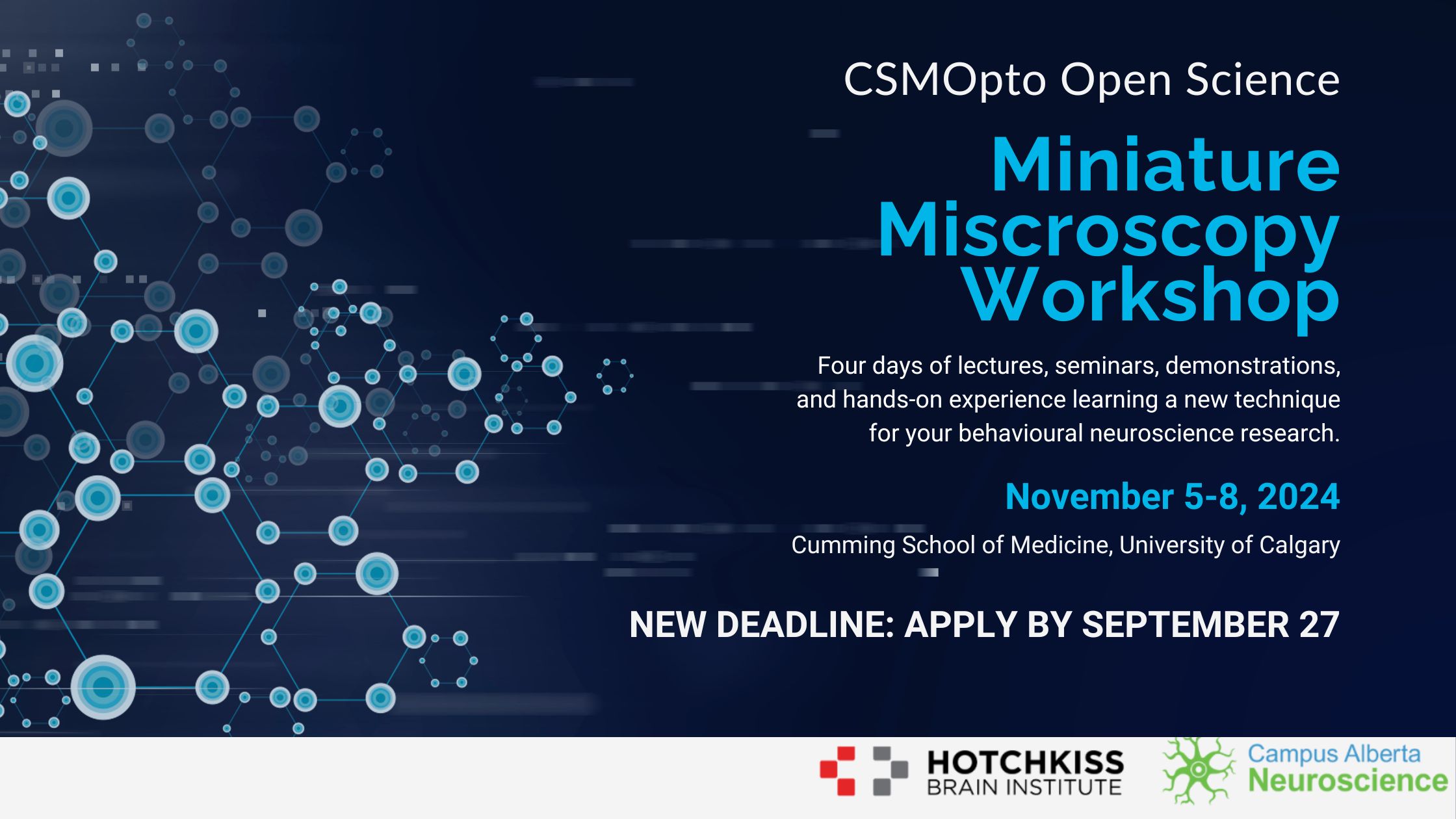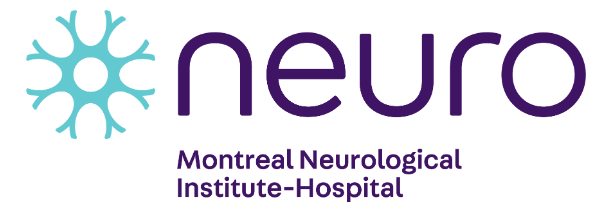CSMOpto Open Science
Miniature Microscopy Workshop

November 5-8, 2024
University of Calgary
Campus Alberta Neuroscience (CAN), is proud to support the Cumming School of Medicine Optogenetics Core Facility (CSMOpto) at the University of Calgary in offering a new workshop in the technique of miniature microscopy.
Overview
Miniature microscopy brought a solution for a long-standing need in neuroscience: recording the activity of specific neurons in freely behaving animals. This technique allows for the visualization of individual neurons with high spatiotemporal fidelity. However, the implementation of this method is hindered by challenging surgeries, difficult experiments, and complex data analysis.
To overcome these challenges and improve wide-spread adoption of miniature microscopy in biomedical and neuroscience research, CSM Opto is offering an intensive workshop for neuroscientists who would like to integrate miniature microscopy into their skillset.
Workshop Content
The workshop will take place in person at the University of Calgary over four days. It will include lectures, seminars, demonstrations, and some hands-on work. Topics will include:
- Introduction to Miniature Microscopy
- Genetically encoded biosensors and optogenetic proteins
- Model systems and delivery methods
- General principles and limitations of miniature microscopy
- Miniature Microscopy Data Collection
- Basic concepts of data collection
- Pairing recordings with behavioural analyses
- Combinations with optogenetic stimulation
- Multi-site and multi-colour recordings
- Surgical Demonstrations
- GRIN lens implantation
- Imaging as a targeting aid
- Post-operative care
- Experimental Demonstrations
- Scruff-free animal handling training
- In vivo recording on neuronal activity of freely behaving mice
- Miniature Microscopy Data Analysis
- Data pre-processing
- ROI definition
- Data Interpretation
- Signal analysis
- Computational modelling
There will also be a special Research Seminar presented by Dr. Axel Nimmerjahn from the Salk Institute.
Teaching Team
This workshop will be led by specialists of the CSM Opto specialists, faculty at the University of Calgary, and representatives from Inscopix Inc.:
- Dr. Alexander Lohman, Director, CSM Opto
- Dr. Taylor Chomiak, Staff Scientist, CSM Opto
- Dr. Tamas Fuzesi, Staff Scientist, CSM Opto
- Leonardo Molina, Staff Scientist, CSM Opto
- Dr. Jianjun Sun, Surgical Specialist, CSM Opto
- Dr. Ibukun Akinrinade, Post-doctoral Fellow, CSM Opto
- Dr. Frank Visser, Manager of HBI Molecular Core Facility
- Dr. Wilten Nicola, Assistant Professor, Department of Cell Biology and Anatomy
- Dr. Becky Fallon, Inscopix Sales Manager, Western Markets
- Dr. Shay Neufeld, Inscopix Senior Director, Data Products and Analytics
For more information on the CSMOpto team, please visit their website.
Workshop Application
Space in this Miniature Microscopy workshop is limited, so interested parties are required to submit an application to attend. Thanks to the generous support of CAN, the Hotchkiss Brain Institute, Tanenbaum Open Science Institute, Inscopix, Inc., and the Department of Veterinary Medicine at University of Calgary, there is no registration fee for this workshop and lodging and meals (breakfast and lunch) throughout the course are completely covered.
The full guidelines to apply for the Miniature Microscopy Workshop are available here.
Application Summary
Miniature microscopy enables the precise examination of the activity of specific neuronal populations and allows for the visualization of individual neurons with high spatiotemporal fidelity in awake behaving animals. However, the implementation of this method is hindered by challenging surgeries, difficult experiments and complex data analysis.
This workshop in miniature microscopy aims to offer intensive training to members of the research community who are interested in integrating the technique into their studies, while adhering to open science principles.
The workshop will take place in person at the University of Calgary from November 5th-8th, 2024. Content will include lectures, seminars, demonstrations, and hands-on work with topics including: Introduction to Miniature Microscopy; Data Collection; Surgical Demonstrations; Experimental Demonstrations; Data Analysis; and Data Interpretation. There will also be a special Research Seminar presented by Dr. Axel Nimmerjahn from the Salk Institute.
For complete information on the workshop, please refer to the full Application Guidelines.
| Application Opens: | August 26, 2024 |
| Application Deadline: | September 27, 2024 |
| Notification of Decision: | October 2024 |
| Workshop Dates: | November 5-8, 2024 |
To be eligible for review, applicants must meet the following criteria:
- Academic:
- Master’s students, PhD students, or postdoctoral researchers engaged in neuroscience research with a significant emphasis on neural imaging
- Principal Investigators may apply, but trainees will be given priority
- Geographic:
- Applicants affiliated with a Canadian post-secondary institution will be given priority
- Applicants affiliated with a post-secondary institution outside Canada are eligible to apply
- Additional considerations:
- Applicants should have a well-defined intention for applying the miniature microscopy technique to their research
- Applicants must be comfortable viewing animal surgery and handling rodents
- Proof of Institutional Animal Use Training approvals will be required
- Prior experience with any programming language is not required
For complete information on the workshop, please refer to the full Application Guidelines.
Applications must be submitted electronically through the Online Application Submission. The individual who wishes to attend the workshop must be the one to apply.
It is imperative that the application is proofread before submission; changes to the application after the deadline are not allowed. Only a single copy of an application will be accepted. A list of application questions is provided in the Application Guidelines for reference only.
Applications must be submitted in completion before 12 PM (noon) MT on September 27, 2024.
Late or incomplete applications will not be considered. It is the sole responsibility of the applicant to ensure the application submission adheres to all requirements and is submitted before the deadline.
For complete information on the workshop, please refer to the full Application Guidelines.
All eligible and complete applications will undergo evaluation by a review committee composed of CSMOpto team members and a representative of CAN.
Applications will be evaluated and ranked on the following criteria:
- Preference for Alberta-based applicants
- Preference for neuroscience trainees
- Qualifications and experience of the applicant
- Justification for attendance and benefit to applicant’s program of study or research project
- Benefit and contribution to supervisor’s program of neuroscience research
A maximum of 20 applicants will be invited to participate based on the review committee evaluations. CSMOpto and CAN will not enter discussion on specific items in the review process or reasons for the rejection of applications. All decisions are final and cannot be appealed.
For complete information on the workshop, please refer to the full Application Guidelines.
Successful applicants must accept their offer within five (5) business days of receiving the notification of decision from CAN. An acceptance form will be provided and must be returned with supporting documentation to CAN by email, signed by all relevant parties, within this timeframe. Any potential conditions or required clarifications and their related timelines will be outlined with the offer. Failure to comply with this requirement may lead to withdrawal of the offer.
Successful applicants, on acceptance of their offer, will be registered for the four-day workshop. Registration is covered by CSMOpto, CAN, the Hotchkiss Brain Institute, Tanenbaum Open Science Institute, and Inscopix Inc. Participants will also receive breakfast and lunch for the four workshop days, and for attendees from outside of Calgary, hotel accommodations will be covered.
Successful applicants who accept their offer are required to attend all four days of the workshop and provide feedback to workshop coordinators following the final day.
For complete information on the workshop, please refer to the full Application Guidelines.
For complete information on the workshop, please refer to the full Application Guidelines.
Frequently Asked Questions
This workshop is made possible by support from:
CSMOpto
The Cumming School of Medicine Optogenetics Core Facility’s (CSMOpto) goal is to offer an array of equipment and facilities for the combined use of optogenetic stimulation, fiber photometry, and head-mounted miniscopes with behavioural testing in mice and rats. The facility staff offers expertise in rodent behavioural testing, optogenetics, stereotaxic surgery, data analysis, and technology development. CSMOpto also aims to foster educational development through comprehensive training, support, and teaching for our users. The platform’s technology is fully operational, and our most significant impact to date has been supporting the Cumming School of Medicine and Hotchkiss Brain Institute research excellence including several Nature Neuroscience publications over the past 2 years. For more information, please visit https://hbi.ucalgary.ca/research/opto/.
CAN
Campus Alberta Neuroscience (CAN), established in 2012 with support from the Government of Alberta, is a province-wide neuroscience network connecting the Universities of Alberta, Calgary and Lethbridge to increase the impact of neuroscience and mental health research, education and translation, developing the province as an epicenter for neuroscience excellence. Through collaborative partnerships with researchers, government and health system stakeholders, industry and community organizations, CAN supports and accelerates innovative brain and mental health advances that improve brain health, patient care and quality of life in Alberta and beyond. For more information, please visit albertaneuro.ca.
UCVM
The University of Calgary Faculty of Veterinary Medicine (UCVM) is a Canadian veterinary school located in Calgary, Alberta at the University of Calgary. The faculty was established in 2005 to meet Alberta’s need for highly-skilled veterinary graduates to support rural Alberta, production animal and equine industries, animal and human health research, and public health. Before the establishment of the Faculty of Veterinary Medicine at the University of Calgary, the only veterinary school in western Canada was the Western College of Veterinary Medicine at the University of Saskatchewan. UCVM offers DVM & Graduate Programs, Advanced Clinical Training, Pathology & Diagnostic Services, and conducts research in animal and human health. For more information, please visit https://vet.ucalgary.ca/.
TOSI
The Tanenbaum Open Science Institute (TOSI) was founded to drive the adoption of Open Science across Canadian neuroscience research institutes. In addition to promoting Open Science within The Neuro, TOSI engages in strategic collaborations and partnerships through its Open Science Support and Partnership Framework. Through the Framework TOSI supports and guides other institutes in adopting Open Science practices and principles and establishes an alliance of neuroscience research institutes across Canada committed to Open Science. For more information, please visit their webpage.
Inscopix, Inc.
During and after the workshop Inscopix will provide attendees 4-weeks of access to the Inscopix cloud-based analysis software, IDEAS, for continued, independent exploration of analysis methods based on training and data provided in the workshop. More details about Inscopix can be found on the website (www.inscopix.com) and questions ahead of the workshop about Inscopix technology can be directed to sales.inscopix@bruker.com






